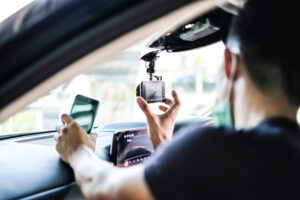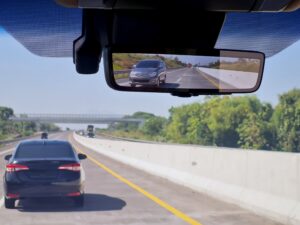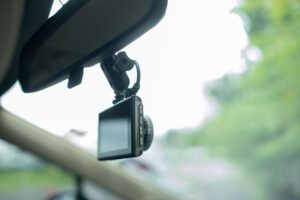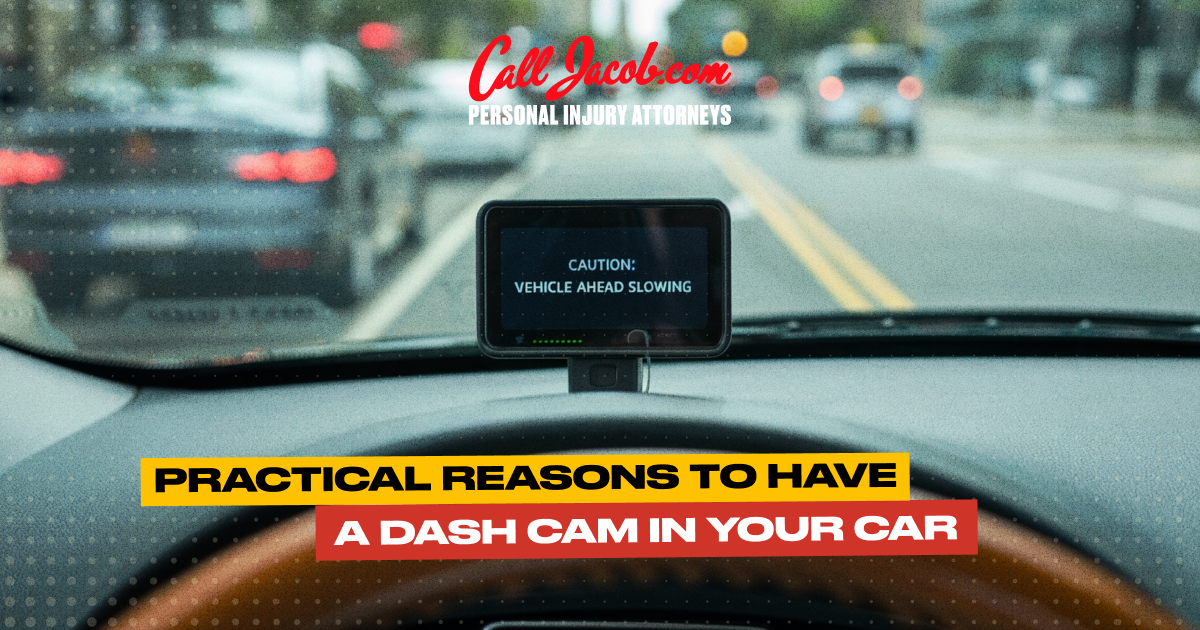Do you have a dash cam in your car? While these handy devices may seem like they’re only intended for Uber drivers and other people who drive for work, they’re becoming increasingly popular among Southern Californian commuters and vehicle owners for capturing video in the event of a car crash or other incident.
Explore the legal and insurance benefits of dash cams, how they work, how to choose a dash cam that’s right for you, and the realities behind common dash cam misconceptions.

What Is a Dash Cam and How Does It Work?
A dash cam is a small camera that’s mounted in your vehicle. They’re used to record evidence in case of accidents or other incidents while driving or parked. Dash cams constantly record while you’re driving, backing up the footage to an SD card or to the cloud.
Some dash cams only collect footage while the car is in motion, while others continue to record even when the car is parked, in case of parking collisions. Advanced models can also collect GPS data, motion detection, speed tracking, or dual-direction filming to capture the front and rear of your vehicle.
Practical Benefits of Having a Dash Cam in Your Car
Should you get a dash cam? There are some practical benefits of using these devices in a car. Dash cams can:
- Protect yourself legally after a car accident by proving that the other driver is at fault.
- Protect you from fraud by allowing you to disprove staged accidents or false insurance claims against you.
- Ensure accountability and safe driving for teens who use the family vehicle.
- Provide deterrence against vehicle thieves.
- Record footage for road-trip time-lapse videos.
Legal and Insurance Benefits of Having a Dash Cam
The main reason having a dash cam is a good idea is to gain protection from legal and insurance troubles after car accidents that were not your fault. Here’s how these devices help you avoid lawsuits and skyrocketing car insurance premiums.
Strengthening your Insurance Claims
Determining fault is a key aspect of settling insurance claims following a car accident. While this is sometimes done with witnesses and other forms of evidence, a dash cam is a nearly irrefutable way to show how an accident really happened.
Potential Insurance Discounts
In some cases, having a dash cam can save you on vehicle insurance. You’re more accountable when a camera is constantly rolling in your vehicle, making you a safer bet for your insurance provider. While most companies don’t offer direct discounts, dash cams can help you keep premiums low.

Legal Protection in Hit-and-Run Cases
Normally, being the victim of a hit-and-run leaves you with few options if you can’t identify the other driver. Dash cams offer high-quality recording technology, which can help you and the police track down negligent or dangerous drivers after a hit-and-run incident.
Safety and Security Advantages
In addition to the benefits to your insurance and any future car accident personal injury or property damage claims, dash cams offer several safety and security advantages.
Thief and Vandal Deterrence
Many dash cams feature a parking mode, during which they run constantly while the vehicle is off or is activated by motion around the car. Even if your specific dash cam doesn’t have this feature, the fact that it exists runs often enough to deter a would-be car thief.
Encourages Safe Driving
Whether you put dash cams in commercial vehicles driven by your employees or have one in the family vehicle that your teenager uses, they’re a great way to remind people to drive safely and legally, adding an extra layer of accountability.
Video Evidence
Whether it’s capturing a crash involving your vehicle, getting footage of someone else getting into a collision, or being in the perfect spot to film a meteor flying through the sky, dash cams are always rolling. They offer invaluable peace of mind (and sometimes, amazing moments caught on film) for drivers.
Choosing and Setting Up the Right Dash Cam
Single-channel cameras are the most common (and least expensive), but they don’t offer comprehensive coverage like a front and rear camera. Dash cams that run while you’re driving are good for accident protection, but they won’t be recording if your car is hit while parked.
Generally, opt for a dash cam with as many features as possible, since these offer more protection than simpler options. GPS, night vision, and high-resolution quality are all great features to invest in. Consider suction-cup-mounted models, which are quick to install and stay reliably in place.
Concerns and Misconceptions About Dash Cams
Dash cams are a relatively new technology, surrounded by myths and misconceptions. For example, some people may worry that installing dash cams in fleet vehicles or those carrying passengers may be a legal violation of privacy. While this is a real concern, California’s two-party consent law allows you to record anything you like, as long as passengers and drivers are aware of it and can provide their consent.
Some also believe that it’s illegal to place a dash cam on your windshield. California law states that dash cams may be placed on the windshield, provided they meet specific size and positioning requirements.

Contact The Law Offices of Jacob Emrani Today
A dash cam can be the difference between receiving compensation after a car accident and being left with nothing. By investing in these small but valuable devices, you protect yourself from liability and fraud, gain better monitoring of those driving your vehicle, and get invaluable peace of mind.
If you have more questions about dash cams or how footage from your camera could be used to pursue compensation after a car accident, call The Law Offices of Jacob Emrani at (888) 912-7115 to set up your no-cost case evaluation!




